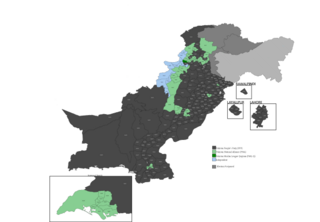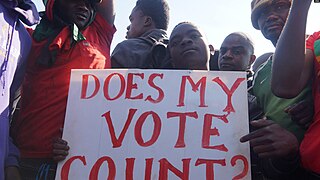Related Research Articles

Guyana is a parliamentary republic in which the President of Guyana is both head of state and head of government. Executive power is exercised by the President, advised by a cabinet. Legislative power is vested in both the President and the National Assembly of Guyana. The judiciary is independent of the executive and the legislature.
The history of Guyana begins about 35,000 years ago with the arrival of humans coming from Eurasia. These migrants became the Carib and Arawak tribes, who met Alonso de Ojeda's first expedition from Spain in 1499 at the Essequibo River. In the ensuing colonial era, Guyana's government was defined by the successive policies of the French, Dutch, and British settlers. During the colonial period, Guyana's economy was focused on plantation agriculture, which initially depended on slave labor. Guyana saw major slave rebellions in 1763 and 1823. Following the Slavery Abolition Act of 1833, 800,000 enslaved Africans in the Caribbean and South Africa were freed, resulting in plantations contracting indentured workers, mainly from India. Eventually, these Indians joined forces with Afro-Guyanese to demand equal rights in government and society. After the Second World War, the British Empire pursued policy decolonization of its overseas territories, with independence granted to British Guiana on May 26, 1966. Following independence, Forbes Burnham rose to power, quickly becoming an authoritarian leader, pledging to bring socialism to Guyana. His power began to weaken following international attention brought to Guyana in wake of the Jonestown mass murder suicide in 1978.

Linden Forbes Sampson Burnham was a Guyanese politician and the leader of the Co-operative Republic of Guyana from 1964 until his death in 1985. He served as Premier of British Guiana from 1964 to 1966, Prime Minister of Guyana from 1964 to 1980 and then as the first executive president of Guyana from 1980 to 1985. He is often regarded as a strongman who embraced his own version of socialism.
There are several communities named Bush Lot in Guyana. This article covers four locations.

General elections were held in Pakistan on 7 March 1977 to elect 200 members of the National Assembly. They were the second general elections held in Pakistan and the first to be held after the Bangladesh Liberation War.
The 2011–2012 Kurdish protests in Turkey were protests in Turkey, led by the Peace and Democracy Party (BDP), against restrictions of Kurdish rights by of the country's Kurdish minority's rights. Although they were the latest in a long series of protest actions by Kurds in Turkey, they were strongly influenced by the concurrent popular protests throughout the Middle East and North Africa, and the Turkish publication Hürriyet Daily News has suggested that the popularly dubbed "Arab Spring" that has seen revolutions in Egypt and Tunisia may lead to a "Kurdish Summer" in the northern reaches of the Middle East. Protesters have taken to the streets both in Istanbul and in southeast Turkey, with some demonstrations also reported as far west in Anatolia as İzmir.
There were two waves of violence in Guinea in 2013, first in February and March, then in July.
The Ruimveldt Riots took place in British Guiana in 1905. It reflected the widespread dissatisfaction among workers with their standards of living. The uprising began in late November 1905 when the stevedores – dockworkers – of the capital Georgetown went on strike and demanded higher wages. The strike grew, with many workers joining in an alliance. On 1 December 1905 – today known as "Black Friday" – the situation came to a head. At the Plantation Ruimveldt, not far from Georgetown, a large crowd of porters refused a demand by the police and a detachment of artillery to disperse. The colonial forces opened fire, and four workers were seriously injured.
Starting from 16 February 2019, the opposition parties organized a series of protests and rallies against the government to demand new elections and the formation of a technocrat government that would ensure the fairness of the electoral process, citing electoral fraud and corruption in the government as the main reasons for the need for change.

The 2019 Malawian protests were a series of nationwide rallies and strikes about government pensions, the results of the 2019 Malawian general election and demands for democratic reforms. Anti-presidential unrest was met with police violence against demonstrators. Soon, they used live rounds, tear gas and batons to disperse protesters who protested for three months against the president.

The 2019–2020 Guinean protests, or the Front National pour la Défense de la Constitution (FNDC), were a series of violent protests and mass civil unrest around Guinea against the rule of Alpha Condé that first broke out on 14 October 2019 against constitutional changes. More than 800 were killed in violent clashes and political scenes yet ethnic clashes and this spawned even further rhetoric, while the protesters still resisted despite the harsh repression. After the 2020 Guinean presidential election, widespread unrest took place, leading to the deaths of 27 protesters.
The 2019–2020 Afghanistan protests were a series of sometimes violent demonstrations and protests against the government of the Islamic Republic of Afghanistan in the wake of the 2019 Afghan presidential election.
The 2011–2012 Tunisia protests was a series of increasingly violent street demonstrations characterised by popular unrest and civil riots against economic grievances and deteriorating conditions in Tunisia. Inequality and unemployment has also been a trigger of nationwide civil disorder and massive disobedience. The fresh protests first began as a wave of national peaceful protests on 14–21 January against the government and demanded a civilian government and fresh elections to be held immediately. Instead, the interim government has led the 2011 Tunisian presidential election. But the protests adapted to different towns and regions, and mass demonstrations re-erupted nationwide. In 2012, massive labour strikes and anti-government riots have been ongoing, with police brutality becoming violent and more extreme. Women strikes and hunger strikes had been held nationwide in August–September. University students also led national student protests in protest at economic conditions. Nationwide protests against the government and Police brutality led by youths had been held in Tunis, Sousse and Gafsa and poor neighbourhoods in cities nationwide in November–December. 8 were killed in the mass uprising and political movement. Insurrectional demonstrations continued and ultimately led to the 2013–2014 Tunisian political crisis.
The 2020 Ivorian protests were a series of massive rioting and increasingly violent street demonstrations adding to the growing massive street protests and civil disorder sweeping Ivory Coast. The protests were against the results and the re-run of president Alassane Ouattara. These protests were major anti-government opposition protests, and consisted of supporters of opposition protests in Abidjan and other cities in support of democratic reforms. Protesters used nonviolent tactics but met with intense violence back from the riot police.
The 1968 Senegal uprising was a nationwide revolutionary uprising that broke out after strikes led by young students in Dakar against a proposed scholarship law in universities and high schools turned into an anti-ruling class protest movement that led to a full-scale protest movement nationwide and large-scale violence and chaotic scenes in popular demonstrations. Looting and riots was witnessed during national protests and civil disobedience movement across the nation.
The 2018–2019 Comoran protests were a series of mass protests and a deadly uprisings consisting of strikes, riots, demonstrations, and marches in opposition to president Azali Assoumani in Comoros in 2018–2019.
The 2019 Albanian protests were demonstrations and protests led by the opposition, between February and June 2019, calling for the cancellation of the 2019 Albanian local elections, fresh elections, the resignation of prime minister Edi Rama and his entire cabinet and the installation of a new technocratic government.
The 2003 protests in the Dominican Republic consisted of mass protests, rioting, labor unrest, strikes, demonstrations, rallies, marches, and a protest movement in Dominican Republic between July-November 2003, calling for economic reform despite the economic crisis and financial turmoil, one of the main causes of the political uprising. The movement and uprising were calling for the government of Hipólito Mejía to resign amid popular pressure and anti-presidential opposition on the streets.
The 2009 Gabonese protests was rioting and popular disturbances with immediate unrest and violent opposition-led street demonstrations and growing civil disobedience movement across Port Gentil and Libreville in Gabon after the immediate results of the 2009 Gabonese presidential election was announced. Two were left dead amid the unrest, clashes and fighting between the rival forces. French interference in the actions sparked national outrage, one of the causes if the immediate unrest.
References
- ↑ "Watch: Protests over 'rigged' elections in Berbice and along East Coast". Stabroek News. March 6, 2020.
- ↑ "Protester killed in Guyana as unrest spreads over vote fraud reports". Reuters. March 7, 2020.
- ↑ "Violent protesting by PPP supporters lead to injury of children and police". Department of Public Information, Guyana. 6 March 2020.
- ↑ "Guyana election: Two main parties declare victory as tensions rise". BBC. 5 March 2020.
- ↑ "Protester Killed in Guyana as Unrest Spreads Over Vote Fraud Reports". US News. March 7, 2020.